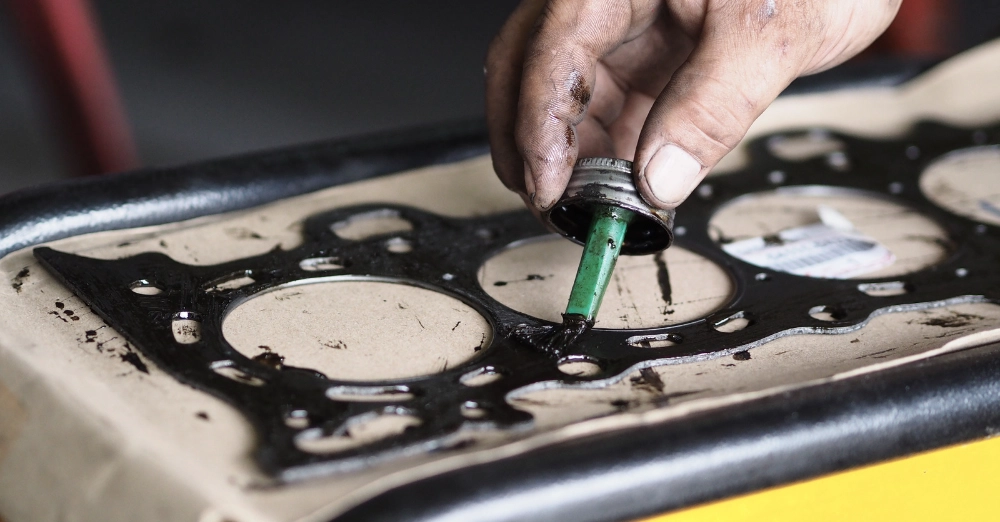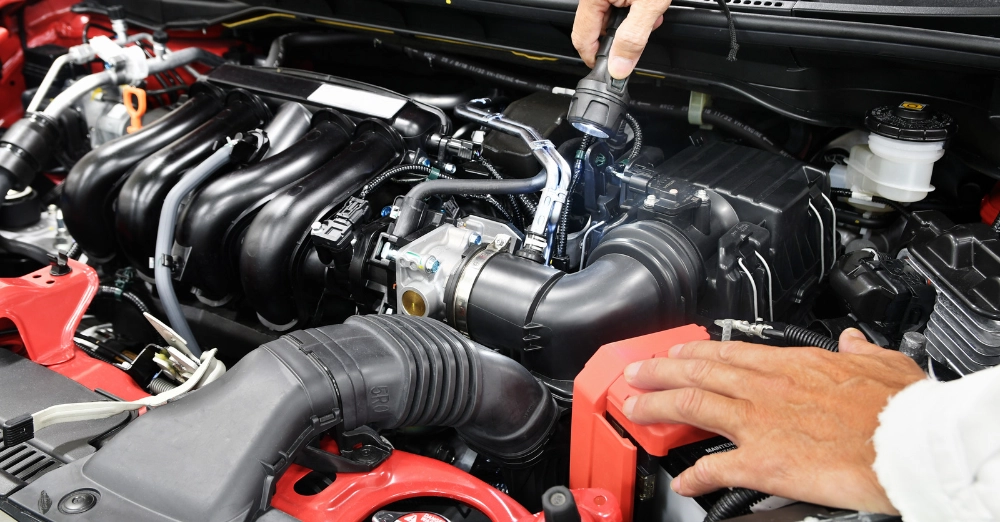The head gasket is an important part of the engine that seals the cylinder head and engine block. Head gasket repair cost is an important consideration for car owners facing head gasket failure.
On average, the cost of head gasket restoration ranges from $1,867 to $2,166, which varies depending make and model of the car, the severity of the damage, and labor costs. Some common symptoms of head gasket failure are overheating, engine coolant leaks, and more.
In this Dbd guide, we have included all the information on the prices and preventions of head gasket repair cost. We consulted with professional mechanics to find out all the related expenses.
What is a Head Gasket

The head gasket is vital in maintaining proper engine compression and preventing coolant or oil leakage.[1]Kia, “What is a head gasket in a car, … Continue reading Its primary role is to seal the combustion chamber, allowing the engine to generate the required power. This prevents the engine from overheating and potentially catching fire, ensuring optimal engine performance.
The head gasket is an essential component of the engine that seals the cylinder head and engine block. It separates the combustion chamber from the coolant passages, maintaining proper engine compression and preventing coolant and oil from mixing.
Head gasket failure can result in engine damage, and it’s important to understand the common causes to prevent it. Some common causes of head gasket failure are:
Overheating
High engine temperatures can cause the head gasket to warp or crack, leading to coolant leakage and engine damage.
Engine coolant leaks
A leak in the cooling system can cause the engine to overheat, ultimately leading to head gasket failure.
Poor installation
Improper installation or incorrect head gasket sealers can cause the head gasket to fail.
Age and wear
As the head gasket ages, it may become brittle and lose its ability to seal properly, leading to a broken head gasket.
If your engine experiences head gasket failure, it’s important to address the issue immediately to prevent further damage. Although repair time will depend on the extent of the damage, it often takes a few days.
Signs of a blown head gasket

Unfortunately, head gaskets can fail over time, leading to serious engine problems. Some common signs of a blown head gasket include coolant loss, white smoke from the exhaust, and engine misfires.
Here is the breakdown of blown head gasket symptoms:
Coolant loss
A blown head gasket can cause coolant to leak from the engine. You may notice that the coolant level in your radiator or overflow tank is lower than normal, or you may see puddles of coolant under your vehicle.
White smoke from the exhaust
Another sign of a blown head gasket is white smoke from the tailpipe. This is caused by coolant leaking into the combustion chamber and being burned along with the fuel. The white smoke is steam, and it may have a sweet smell to it.
Engine misfires
A blown head gasket can also cause one or more cylinders to misfire. This can result in a rough idle, poor acceleration, or a loss of power. You may also notice that your engine is running hotter than usual.
Average Head Gasket repair cost

Head gasket repair costs vary based on several factors, including the make and model of the vehicle, the severity of the damage, and the mechanic’s hourly rate.
On average, the head gasket replacement cost can range from $1,867 to $2,166.
The cost of labor for head gasket repair is typically estimated to be in the range of $1,079 to $1,361, while the cost of parts can vary between $789 and $806. However, the price may be higher for luxury or high-performance cars.
Here are some factors that can affect the cost of head gasket repair:
Make and model of the vehicle
The cost of head gasket repair can vary significantly depending on the make and model of the car. Some cars are more complicated to work on, which can increase the labor cost.
Severity of the damage
If the head gasket leak is minor, the head gasket sealer may be an option, and the repair cost will be lower. However, if the engine has suffered severe damage due to the blown head gasket, the cost of engine repair can be high.
Hourly rate of the mechanic
The hourly rate of the mechanic can affect the cost of head gasket repair. Some mechanics may charge more than others, depending on their experience and location.
Cooling system
If the cooling system has been compromised due to a blown head gasket, additional repairs may be required, increasing the total cost.
Engine compression
If the engine compression has been affected due to a blown head gasket, additional repairs may be required, increasing the total cost.
Cost of head gasket repair for popular car models
The cost of head gasket repair can vary depending on the make and model of the vehicle. Here’s a breakdown of the estimated head gasket replacement cost for popular car models, including Toyota, Honda, and Ford:
| Car models | Cost of head gasket repair |
|---|---|
| Hyundai | $2,060 to $2,451 |
| Toyota | $4,077 to $5,863 |
| Honda | $3,388 to $4,148 |
| Ford | $1,436 to $3,603 |
Preventing head gasket failure

One of the most common and expensive car repairs is head gasket failure. When a head gasket fails, it can lead to major engine damage and costly repairs.
Fortunately, there are several preventative measures car owners can take to avoid head gasket failure, such as:
Regular engine maintenance
Scheduled maintenance such as oil changes, tune-ups, and replacing worn parts can help prevent head gasket failure.
Monitor engine temperature
Keep an eye on the temperature gauge and be mindful of any unusual fluctuations in temperature. Overheating can cause blown head gaskets.
Check coolant levels
Low coolant levels can lead to overheating and cause damage to the head gasket.
Avoid engine overheating
Regularly check and replace the radiator cap and thermostat if necessary. These components regulate engine temperature and help prevent damage to the head gasket.
Address engine problems promptly
Ignoring engine problems, such as misfiring or oil leaks, can lead to more severe issues, including blown head gaskets.
Use quality engine oil
Using the correct type and quality of engine oil can reduce wear and tear on the engine block and cylinder head.
Avoid engine modifications
Modifying the engine, such as installing high-performance parts, can increase the risk of head gasket repairs. It may be due to the added stress on the engine.
Related Stories
- Find out everything about Honda Tune Up Cost with our guide.
- Check this guide to know everything about Nissan Tune Up Cost.
- Check this guide on Hyundai Check Engine Light – here.
- Find out everything about Jeep Tune Up cost with our guide.
- Need to replace your Tesla battery? Find out everything about Tesla Battery Replacement cost with our guide.
FAQs
How long does it take to repair a head gasket?
Generally, it can take anywhere from six hours to a few days to complete the repair. The time it takes to repair a head gasket varies depending on the extent of the damage.
Is it possible to repair a head gasket without replacing it?
Yes, you can fix head gaskets with small leaks without replacing them. However, these methods are usually only effective for minor leaks and may not provide a long-term solution.
Can I drive my car with a blown head gasket?
No, driving with a blown head gasket can be risky, and it’s crucial to get it fixed as soon as possible. Fixing early can prevent engine damage and ensure safe driving conditions.
What causes a head gasket to fail?
A head gasket can fail due to overheating, coolant leaks, poor installation, or age and wear. It’s essential to address the issue immediately to prevent engine damage.
Overall, it’s important to consider the potential head gasket repair cost when maintaining your vehicle to prevent costly engine damage.
We hope our guide has provided you with all the necessary information you need to know about the cost of head gasket repair.
- 107shares
- Facebook Messenger
About the author
DbdPost Staff is a team of writers and editors working hard to ensure that all information on our site is as accurate, comprehensive, and trustworthy as possible.
Our goal is always to create the most comprehensive resource directly from experts for our readers on any topic.


![How Much Does it Cost to Wrap a Car in [year]? how much does it cost to wrap a car-feature image](https://dbdpost.com/wp-content/uploads/2021/09/how-much-does-it-cost-to-wrap-a-car-feature-image-150x150.jpg)
![How to Delete Shein Account? ([year] Edition) feature image-how to delete shein account](https://dbdpost.com/wp-content/uploads/2021/10/feature-image-how-to-delete-shein-account-150x150.png)
